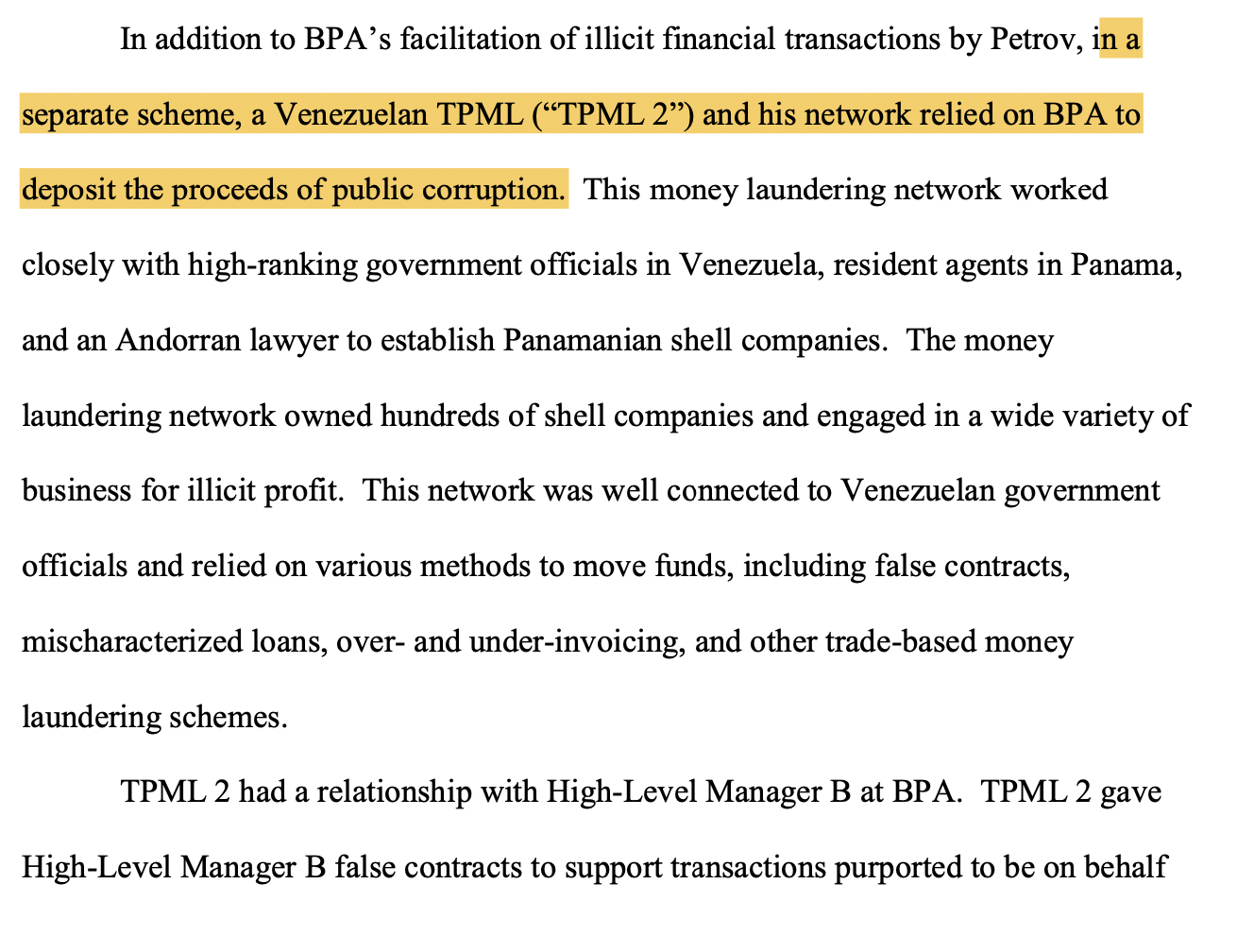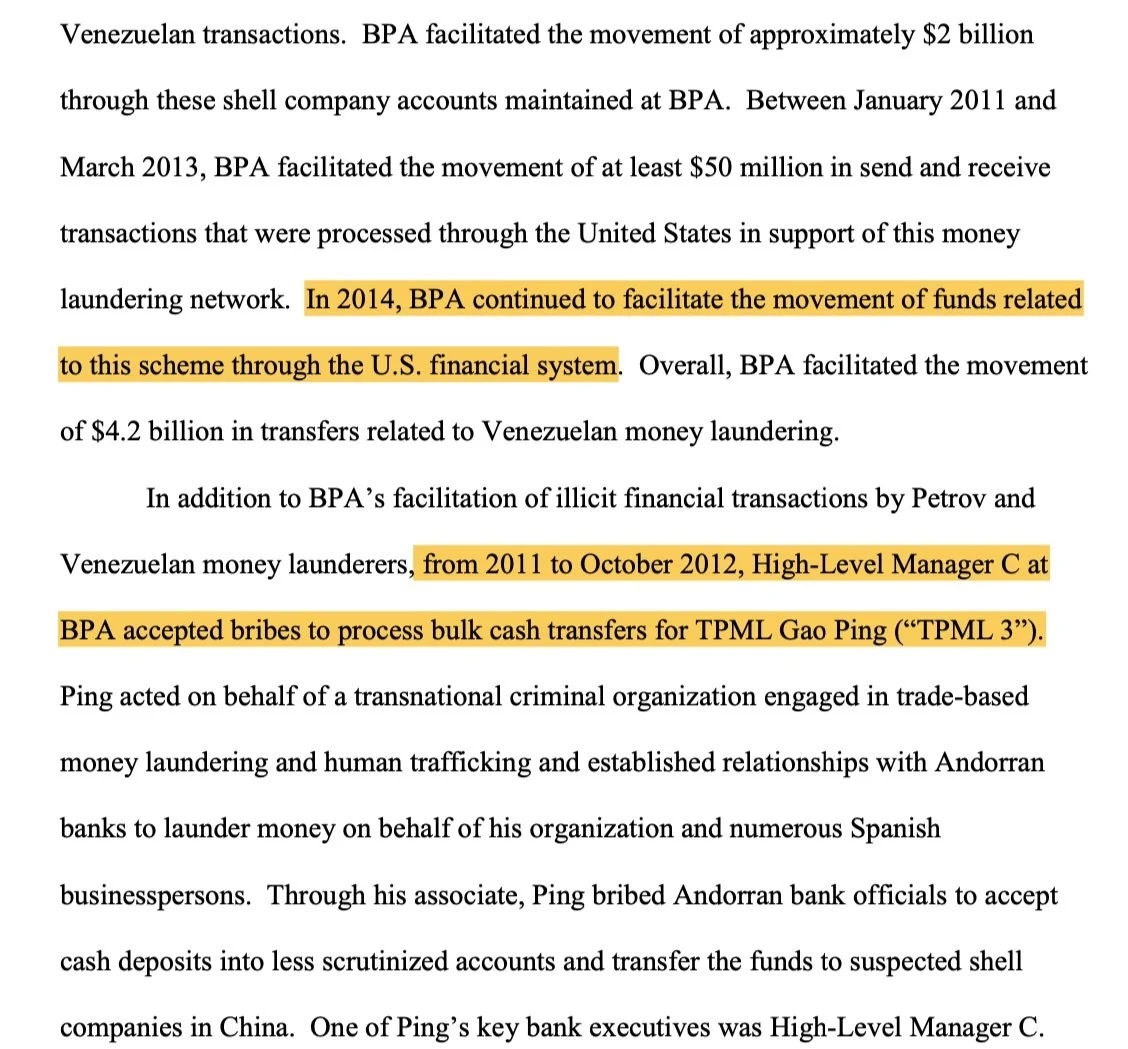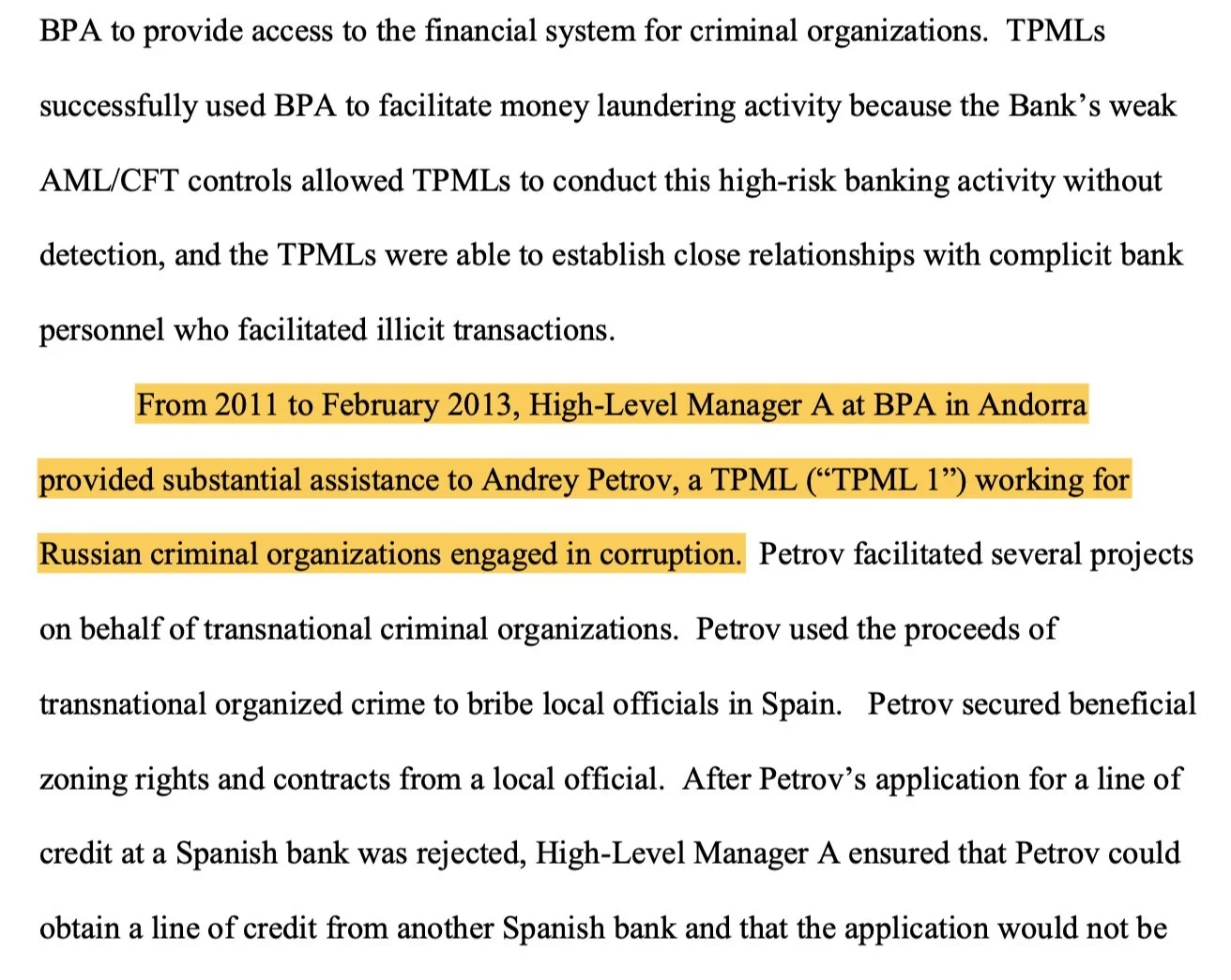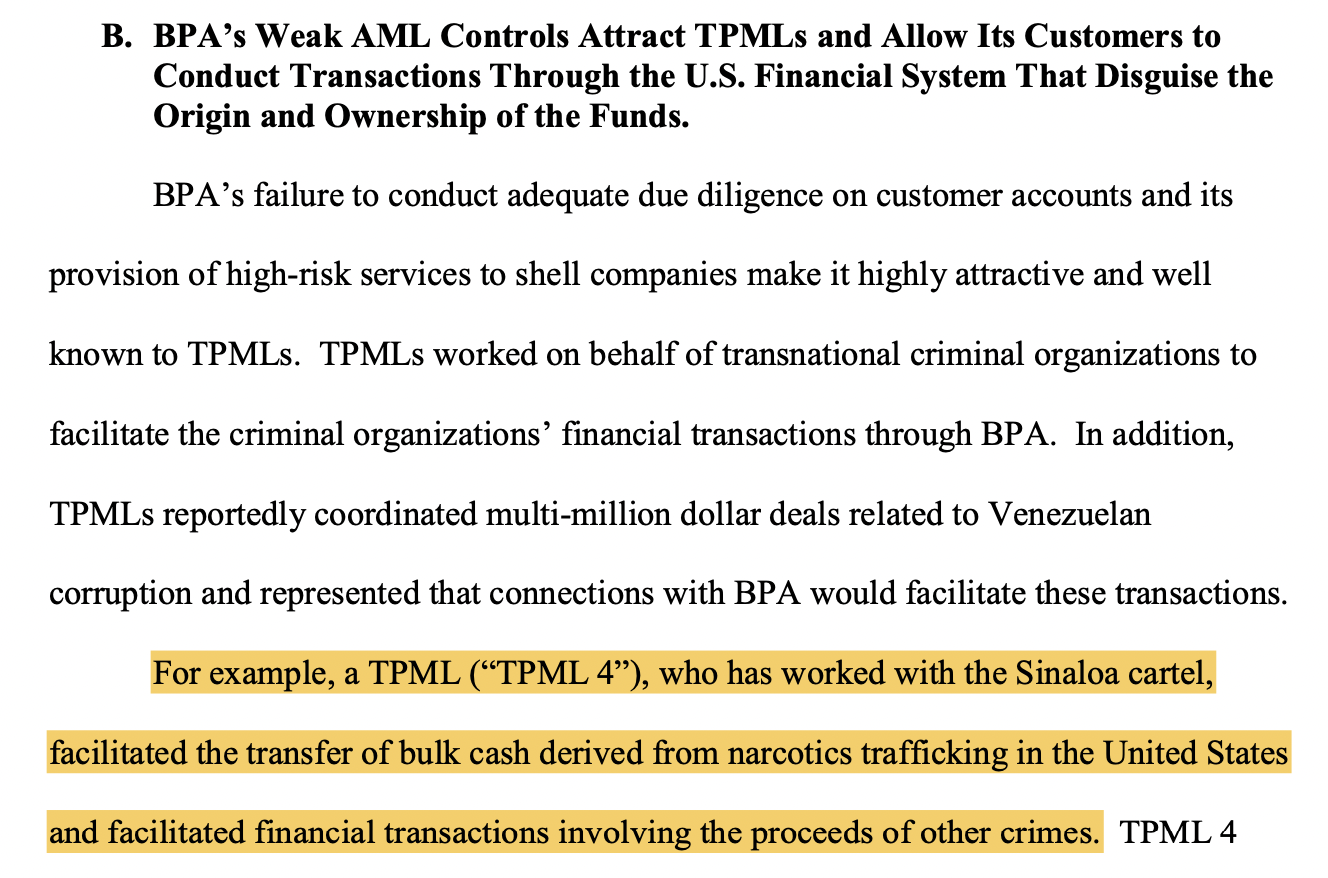Evidence of false allegations & a political conspiracy against BPA
FinCEN’s Allegations
Banca Privada d'Andorra (BPA) was one of Andorra’s largest and fastest-growing banks, until its dissolution in 2015. On March 6, 2015, the US Treasury Financial Crimes Enforcement Network (FinCEN) published a notice of finding that designated BPA as a foreign financial institution of primary money laundering concern under Section 311 of the USA PATRIOT Act. On the back of the FinCEN notice, Andorran and Spanish financial authorities intervened and closed down BPA and its Spanish subsidiary, Banco Madrid. In 2016, FinCEN withdrew its notice stating that BPA no longer posed a threat to the US financial system.
BPA has since been cleared of any wrongdoing by the Spanish courts. Furthermore, new evidence has come to light that suggests that the targeting of BPA and Banco Madrid was part of a wider political conspiracy, orchestrated by the Spanish and Andorran governments, designed to expose the financial affairs of Catalan separatist politicians.
BPA’s shareholders are still fighting for justice. The information listed below deals with the veracity of the allegations made by FinCEN and evidence that points towards the motivation of Spanish and Andorran authorities to act against BPA.
In its Section 311 notice, FinCEN accused BPA of facilitating expansive money-laundering operations involving organised crime figures in Russia, Venezuela, Spain, and China. All of these allegations refer to matters that BPA had previously addressed and of which the Andorran authorities were aware.
FinCEN did not inform BPA of the accusations against it and did not allow BPA to respond prior to the publication of the notice.
In 2014, the Andorran National Institute of Finances (INAF) requested Andorran banks to provide information regarding reputational risks that could affect financial institutions and the wider banking industry in Andorra. On 24 March 2014, BPA submitted its report, which included the cases that were later reported by FinCEN. BPA did not receive any warning or comments about the issues raised in the report by the INAF.
1. Venezuelan case (Operación Petroleo)
FinCEN’s notice states that BPA provided substantial assistance to Venezuelan money launderers who deposited proceeds of public corruption in their accounts in the bank.
However, the Andorran authorities knew about these accounts, as they featured in the bank’s yearly audit and in the report submitted to the INAF, and they also gave BPA permission to continue working with the Venezuelan nationals as clients.
In 2012, an Andorran court preemptively blocked several accounts owned by Venezuelan nationals in BPA and an investigation was launched by the INAF. After two years, the customers passed the authorities’ due diligence analysis and the courts did not find any evidence of money laundering. As a result, the accounts were unfrozen and the Venezuelan nationals remained clients of BPA.
Funds from other bank accounts in Andorra and the US were paid into the BPA accounts owned by the Venezuelan nationals. None of these other banks detected any irregularities or received warnings from Andorran or US financial authorities.
2. Ping case (Caso Pallardó)
FinCEN’s notice states that BPA assisted Chinese businessman Gao PING with money laundering through his associate Spanish national Rafael PALLARDÓ, who was a client of the bank between 2008 and 2011. However, when BPA expanded to Spain in 2011, the bank dropped PALLARDÓ as a client as his activities could be considered tax evasion, which is a criminal offence in Spain but not in Andorra.
FinCEN’s notice also states that PING tried to bribe BPA in order to take PALLARDÓ back as a client but there is no evidence that BPA reinstated PALLARDÓ.
PALLARDÓ’s past involvement in BPA was neither unknown to Andorran authorities prior to FinCEN’s notice nor exclusively linked to the bank. PALLARDÓ featured in the audit reports submitted to the INAF in 2011 and 2012 and was mentioned in the report submitted to the INAF in 2014. PALLARDÓ also had accounts in other Andorran banks, including Morabanc, Andbank and Crèdit Andorrà.
3. Petrov case (Operación Clotilde)
FinCEN’s notice states that BPA provided substantial assistance to Andrey PETROV, a money launderer working for Russian criminal organizations engaged in corruption.
In 2003, Victor KANAYKIN opened an account at BPA and gave limited powers over the account to Spanish resident Andrei PETROV. The account received payments from KANAYKIN’s company through a bank account in Latvia. Additionally, PETROV transferred €2.5 million through BPA, of which €1.5 million came from bank accounts in the United Kingdom and €1 million came from other banks in Andorra.
PETROV and KANAYKIN featured in BPA’s yearly audits and in the report submitted to the INAF in 2014. Additionally, Spanish courts cleared BPA of any wrongdoing regarding PETROV’s involvement in the bank.
4. Sinaloa case (Mexican cartels)
BPA has never worked with the Sinaloa cartel. No evidence regarding this charge has been introduced in the court cases in the US, Spain, or Andorra.
Francisco Martínez February 2023 letter
In a letter sent to Andorra’s Prime Minister, Xavier Espot, the former Secretary of State for the Interior of Spain, Francisco Martínez, confirmed that the Andorran government provided FinCEN with information about BPA in order for the US entity to publish its notice and allow the government to take over the bank.
Martínez states that “the source of the intelligence underlying FinCEN's note is not its own sources (...) but the information provided directly from the Principality of Andorra. If, after judicial investigations, it is considered that the information was incorrect or was deliberately exaggerated or even manipulated, the explanation (is) in Andorra.”
BPA’s former shareholders have stated that the cases mentioned in FinCEN’s notice were previously reported to the Andorran financial authorities, which did not raise any concerns.
Furthermore, Martínez claims BPA’s takeover was triggered by "bad coexistence between banking institutions" in Andorra and a desire by its authorities to "show an exemplary reaction to external financial interlocutors."
The letter was published by Spanish newspaper La Vanguardia on 14 February 2023.
A political conspiracy
The Interview of José Manuel Villarejo
In a May 2022 televised interview, José Manuel VILLAREJO, a retired Spanish police commissioner, admitted that the targeting of BPA had been part of a wider “Operation Catalonia”, which was designed to discredit the Catalan political leader, Jordi PUJOL and his supporters.
He described himself as "one of the coordinators" of 'Operation Catalonia', acting as a bridge, between the Ministry of the Interior and the Spanish National Intelligence Centre (CNI).
He said that the Spanish government had ordered him to send information to the US Treasury Department that would lead to the closure of BPA if BPA did not give up information to the Spanish government about the accounts of pro-independence Catalan politicians.
In leaked audio tapes of a meeting that occurred on 4 March 2014 (obtained in May 2022 by El País, Celestino BARROSO, the Interior attaché at the Spanish Embassy in Andorra, told Joan Pau MIQUEL, CEO of BPA that: “The Bank of Spain [Spain’s central bank] is investigating Banco Madrid [BPA] and they are going to take over it. There is an American company ready to acquire the bank, after the Bank of Spain kills the existing one [Banco Madrid]… That's what I have been told, but they also told me to tell you that it's up to you whether this will come to nothing. Whether the inspection is stopped, and everything remains as it is now, provided that you agree to something. But I don't know what that is about.” BARROSO was sending a warning to MIQUEL that Banco de España was going to take over BPA to unless he complied with the demands from Spanish authorities to reveal banking information on PUJOL.
El País had earlier published a report (on 25 September 2020) — derived from its interviews with witnesses — highlighting that in 2014 “officers working under Eugenio PINO, who was the head of the police department division, Dirección Adjunta Operativa (DAO) and a high-ranking official within the Interior Ministry, decided to target Banca Privada d’Andorra (BPA)”.
The audio leaks also revealed that, by order of PINO, Marcelino Martín BLAS, the former chief of the Internal Affairs division in the Spanish police force went to the Villamagna hotel in Madrid to "pick up a message" from MIQUEL. MIQUEL handed him a slip of paper showing a bank account, the names of Jordi PUJOL, his wife Marta FERRUSOLA and one of their daughters, and several amounts. Another police officer who went to Andorra managed to save a screenshot of the PUJOLs’ account, showing a balance of €3.4 million.
The El Pais report quoted an unnamed former Banco de Madrid official who said: “The police did not believe that that’s all there was [the money]; they believed there was over €100 million and that the bank was not cooperating fully. In the middle of that pressure, somebody informed US authorities about alleged money laundering at BPA.”
May 2022 Leaked Audio tapes
Francisco Martínez November 2020 Letter
In a letter dated to 3 November 2020 and sent to BPA shareholder Higini CIERCO, Spain’s former Minister of the Interior and Secretary of State for Security, Francisco MARTÍNEZ alleged that authorities in Spain, Andorra, and the United States "had served to try to provoke the involvement of BPA in the investigation of the hidden fortune of certain investigated personalities”.
Importantly he explained that “it seems clear that there is no indication of the criminal actions that, apparently, were at the origin of the intervention procedure carried out simultaneously in Andorra and in Spain.”
He further added that: “Subsequent judicial resolutions have demonstrated the disproportionate and even unfounded nature of that action [the attack on BPA], in which the intervened financial entities ended up being sacrificed in the name of an exaggerated demonstration of commitment to the standards of the United States”.
He contended that the bank was “in the spotlight” of the Spanish ministry, as it was the custodian of the fortune of the Catalan PUJOL family, the patriarch of which (Jordi PUJOL) was a key Catalan independence activist.
MARTÍNEZ maintained that "the knowledge of the intention of the US authorities (FinCEN) a year before the corresponding resolution was issued shows that the coordination between money laundering prevention entities in Spain, Andorra and the United States was sustained over time…” MARTINEZ went on to state that this coordination directly led to a Government-endorsed attempt “to provoke BPA's collaboration in the search of the hidden fortunes of certain personalities under investigation.”
He affirmed that it was his “personal conviction that the US authorities for the prevention of money laundering and the financing of terrorism (FinCEN) demanded from the authorities of the Principality of Andorra express signs of commitment to the regulations on the prevention of money laundering and that the way to demonstrate the willingness of those authorities in their country was the surrender of one of the country's financial institutions, BPA…”
MARTÍNEZ also opined that certain decisions were “taken because of the firm political will to carry them out, without it being logical to think that it could be a mere response to the presumptions of the technical bodies.”
“The intervention of Banco Madrid,” he added, “was a practically automatic consequence of the intervention of Banca Privada d'Andorra, and procedures of such scope and repercussions could not possibly have been adopted without the necessary coordination of competent and responsible bodies at the highest level.”
The letter, which was printed in its entirety by El Mundo, was issued as a response to demands from the CIERCO family to clarify MARTÍNEZ's role in the BPA scandal.



